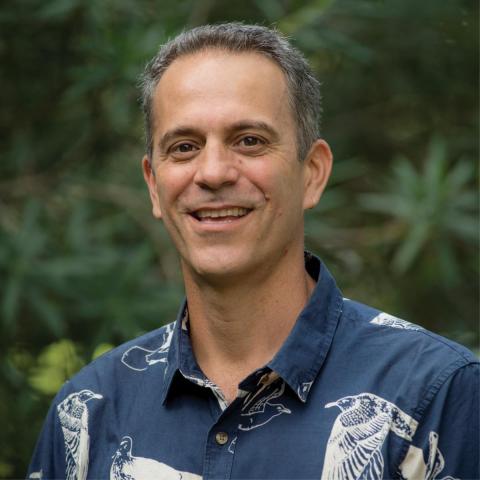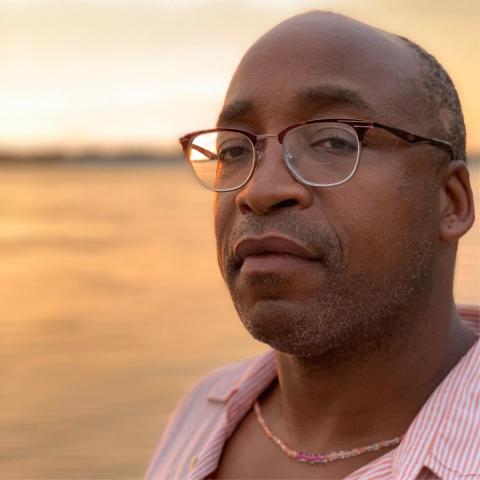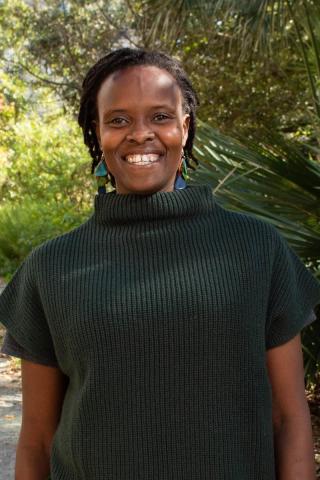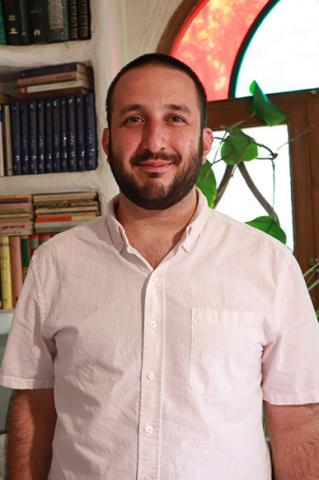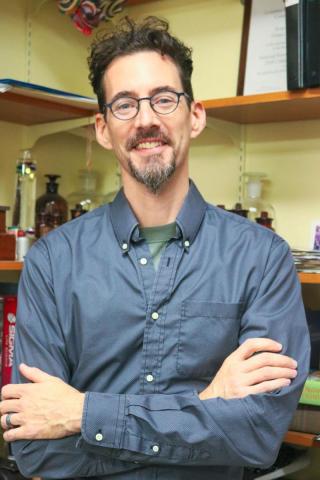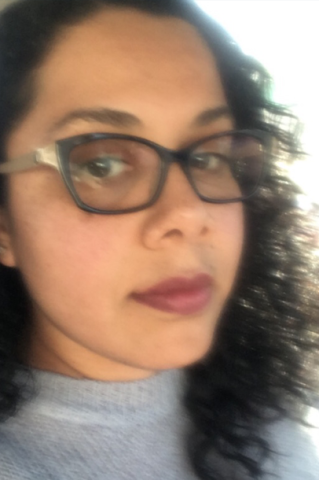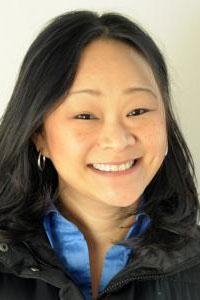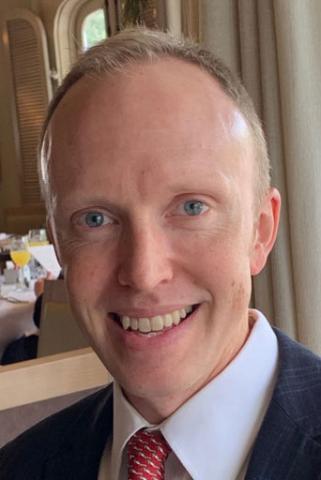2021-2022
Michelle Foa, Ph.D.
Art History

Michael Kuczynski, Ph.D.
English

This course, Paper: Culture, History, and the Digital Age, is an interdisciplinary undergraduate seminar, cross-listed in Art History and English, that examines the global history of paper, its impact on art, literature, and other forms of cultural production in different periods and places around the world, and some of the effects of the digital revolution on art viewing, reading, writing, and thinking.
Jordan Karubian, Ph.D. - Ecology & Evolutionary Biology
The Sustainable Solutions courses is an entry level course to be offered by the Department of Ecology and Evolutionary Biology and cross-listed and co-opted by multiple departments and programs across the university focused on interdisciplinary approaches to understanding socioenvironmental feedbacks and hands-on, experiential learning techniques.
John “Ray” Proctor, Ph.D. - Theatre and Dance
Dr. Proctor's African American Theatre History course is a chronological examination of African-American theater history from 1841 to the present through the study of African-American plays and playwrights, critical race theory, as well as political/social conditions in the United States. Duren funds will be used in this course to bring in weekly guest speakers from all over the country, including black writers, playwrights, film and stage directors, and stage craft designers..
2020-2021
Dorothy J. Cheruiyot, Ph.D. - Ecology & Evolutionary Biology
Dr. Cheruiyot's course, Urban Agroecology and Sustainability in New Orleans, will be project and service learning centered. It will provide a socio-ecological approach to the study of urban food production, by evaluating the pressures driving biodiversity, energy cycling conservation, job creation, human health and well-being. The core of this course will be on vegetable and fruit production in urban landscape. Along with classroom learning related to these topics, students will maintain a community garden, interact with the community around the site of the garden, grow produce and practice problem solving.
Felipe Fernandes Cruz, Ph.D. - History
In summer 2018, Dr. Cruz launched an experimental digital humanities course. In this course, titled “DIY history,” students conducted hands‐on research at a historical archive to build an interactive mixed physical/digital museum exhibit. In the course, students worked at both the Latin American Library archives and the school of engineering’s makerspace. There, they learned to use technologies such as 3D printers and laser cutters, which they employed in building their museum exhibit. Cruz believes that engagement with fields outside of the liberal arts can foster innovation in teaching and research. He plans to use the Duren ship to develop this curriculum to be subject agnostic, and available for other faculty to use. The goal is to make an open‐source pedagogical toolkit, with detailed instructional materials that can be adopted by other s even if they do not have the particular technical skills to execute it. The resulting materials would also be modular, allowing s to take lesson plans for just a particular tech or research skill, and apply it to their class.
Scott M. Grayson, Ph.D. - Chemistry
Dr. Grayson will use the Duren ship to help make traditionally difficult courses, like Organic Chemistry, more relatable for non-chemists. Many students learn about chemistry via memorization, rather than understanding each relevant concept. However, most students would appreciate something other than the lecture-hall format. They would like a “reactivity-based” approach that helps them see how chemistry is used in everyday life. Grayson plans to achieve this through optimization of in-class demonstrations, an emphasis on the number of reactions that highlight the past work of Tulane chemists and adding guest speakers to his curriculum.
2019-2020
Guadalupe García, Ph.D. - History
Dr. García's Duren-supported course, The Latinx South: Historical Antecedents and Contemporary Issues of U.S. Immigration, is a survey of modern-era immigration policies. The course moves from the mid nineteenth-century forward to focus on the contemporary U.S. South, from Hurricane Katrina through present-day transformations ushered in by the rise of private detention facilities and ICE policing. The class will examine debates around Latinx immigration specifically, including how immigration should be regulated, who has the right to migrate and move, and how immigrants participate in local and national economies. Guest lectures and on-site visits to detention facilities will supplement classroom discussions.
Tiffany Lin, AIA - Architecture
In fall 2018, Professor Lin created the inaugural Intro to Design and Creative Thinking course for non-architecture majors who are interested in design. The course, a lecture/studio hybrid, will continue to offer a broad introduction to the fundamental principles of design, visual communication, and creative problem-solving. Duren funds will allow for expanded, hands-on enrichment activities, including design workshops, field trips, and guest lectures featuring local artists, designers, and s from allied departments.
Ian K. Townley, Ph.D. - Cell and Molecular Biology
Duren funds will support the creation of an introductory bioinformatics course, the first of its kind at Tulane. Dr. Townley says, "(It) will be an immersive inquiry and project-based course where students learn both how to manipulate and ask questions of biological data using cutting edge methods." Introductory Bioinformatics will be taught as a special topics course in spring 2020, and he will work to align his course with the future bioinformatics major that Dr. Laurie Earls, 2018-2019 Duren , is developing a curriculum for.
2018-2019
Laurie R. Earls, Cell and Molecular Biology
Duren funds will be used to present seminars for undergraduates, featuring s in bioinformatics programs from other universities; visit faculty at national institutions to learn their processes of establishing a bioinformatics major; establish a consortium to develop a unified bioinformatics curriculum at Tulane; and support student research projects that combine computing and biology.
Adam McKeown, English, "Discovering Colonial America: Louisiana"
In conjunction with the Historic New Orleans Collection and Tulane’s Center for Public Service, Professor McKeown will create "Discovering Colonial America: Louisiana", an online exhibition. Duren funds will go toward a service learning course and related programming to maximize student participation with the exhibition. The course will train students in the work of professional researchers, archivists, and digital publishers, offering them experience in digitization, online publication, archival work of physical and digital materials, digital assets management, and educational programming, while contributing to “a bold and long-overdue rethinking” of U.S. colonial history."
Christopher Oliver, Sociology, Environmental Studies, “Visualizing Environmental Injustice(s): An Exploration of Visual Methods in Research, Advocacy, and Policy in Environmental Studies”
Funds will support “Visualizing Environmental Injustice(s): An Exploration of Visual Methods in Research, Advocacy, and Policy in Environmental Studies,” an expanded version of the fall 2018 section of Professor Oliver’s “Senior Seminar in Environmental Studies.” The enhanced class will include field-based activities, such as visits to local communities led by environmental advocacy and environmental science professionals; specialized training through workshops and seminars by technical professionals; and a visit by a nationally recognized expert in visual arts, methods, and techniques.
2017-2018
Mirya Holman, Political Science: “Of God and Gov't: Religion and U.S. Politics”
This research-intensive course will examine how religion has shaped political events and thinking in the U.S., despite the constitutional ban on "separation of church and state." Students will further analyze the intersection of religion and American politics by designing and implementing a collective survey with embedded experiments. They will also have the opportunity to continue their research after the course via independent study with Holman.
Noshir Pesika, Chemical and Biomolecular Engineering: “Biomimetics: An Approach to Problem Solving”
This interdisciplinary course will encourage students, from diverse fields of study, to use nature as a source of inspiration to develop new technologies and solve engineering problems. In collaboration with the Audubon Nature Institute, students will be asked to determine the unique capabilities of an animal or insect of interest, use microfabrication techniques (photolithography, 3-D printing, and electrochemical deposition) to build a prototype device/surface that exhibits similar properties, and participate in outreach by presenting their prototypes to K-12 students.
2016-2017
Thomas Beller, English: “Narrating the Environment: Lead and Lead Poisoning”
This course, which will also count towards the environmental studies major, will look at the history of lead and the intractable problem of lead poisoning, as well as instances in which lead is present as fact and metaphor in literature. Professor Beller will use Duren funds for field trips to local sites that are directly working with the issue of lead, as well as to invite distinguished writers on the history of lead to campus.
Patrick Button, Economics: “Research Methods in the Economics of Discrimination”
In this course, students will summarize what is known about intersectionality in economics by working on a research article aimed at journal publication, conducting literature reviews and bibliographies, and participating in other research and writing activities. Professor Button’s research involves quantifying discrimination in labor markets faced by Indigenous peoples, and students will also assist in data collection in the field.
Christopher Dunn, Spanish and Portuguese: “Clarice Lispector in Translation"
Widely acclaimed as one of Brazil's greatest modern writers, Clarice Lispector gained an enthusiastic following among post-structuralist and feminist literary critics. Her work has been the subject of renewed interest, due largely to the efforts of essayist and biographer Benjamin Moser, who has endeavored to edit and translate her complete collection of novels, short stories, and essays. This course will focus largely on these new translations to reach a broad audience of students. Duren funds will help bring Moser to Tulane for a week to deliver lectures and conduct workshops in translation.
Michelle Foa, Art History: "The Meaning of Materials"
Professor Foa's course is a multidisciplinary, historically grounded exploration of people's relationship to materials and to their material environment. It will examine the profound impact that various materials have had on societies at different points in time, and will analyze how artists, writers, and philosophers have invested materials with cultural, political, and religious significance. Duren funds will be used to bring a world-renowned art conservator to campus, and to take class trips to local art institutions.
2015-2016
Gaurav Desai, English and African and African Diaspora Studies: “The Invention of Africa” and “Oceans Connect: Atlantic and Indian Ocean Exchanges”
“The Invention of Africa” is an interdisciplinary treatment of the ways in which Africa has been imagined by Western observers, by those in Asia and the Arab world, and by Africans themselves. The “Oceans Connect” course will be designed around the time of the ascendancy of the Omani Sultanate in Zanzibar which by 1837 had gained suzerainty in the region. Professor Desai will use Duren funds to offer both courses and host speakers and scholars in each.
Christopher Dunn, Spanish and Portuguese: “Brazilian Cinema”
This course will be divided into two main parts, which in turn will be divided into multiple units. The first part of this course will focus on authorial film between 1960 and 1980, featuring works by leading directors of the Cinema Novo movement, Cinema Marginal, and the state-sponsored blockbusters of the 1970s. The second part will explore contemporary Brazilian cinema in relation to questions of urban violence, gender & sexuality, the travails of the middle class, and the process of reckoning with the period of authoritarian rule. Professor Dunn will use Duren funds to establish a durable Brazilian Cinema class that can be offered on a bi- or triennial rotation.
Andy Horowitz, History: “The Katrina Disaster Now”
Coinciding with the tenth anniversary of Hurricane Katrina and working across the disciplines of history, sociology, anthropology, geography, political science, and literature, this course will consider Katrina as a political, cultural, and environmental event in New Orleans, American, and transnational history. Duren funds will be used to transform an already ambitious class into something extraordinary: treating the city and region as a classroom, enabling students to have special private tours of the places they are learning about, and supporting a series of salon type lunches with nationally-renowned experts.
2014-2015
Laura Rosanne Adderley, History: “History of Voodoo and Other African-Derived Religions” and “Slavery and Public History”
The History of Voodoo course will explain the history of this New Orleans cultural phenomenon from its roots in West Africa up to present day practitioners, while exploring the misunderstandings about and prejudices against the religion. The Slavery and Public History course engages the way that the U.S. and other societies connected to the history of the Atlantic slave trade have sought to publicly remember (or obscure) this particularly dark history. Duren funds will facilitate local field trips, classroom visits from local practitioners, speakers, and visiting scholars.
Mia Bagneris, Art History: “Contested Visions of the Civil War”
Professor Bagneris will use Duren funds to offer an expanded and enriched version of her seminar, “Contested Visions of the Civil War: Race, Rebellion, Reconstruction, Reunion, Romanticization, Revision and Other Narratives Surrounding the Civil War in American Art and Visual Culture.” Exploring a wide range of art and visual culture including painting, sculpture, photography, film, museum exhibitions, and memorial performances, this course will explore the contested narratives of the Civil War from before the firing of the first shot at Fort Sumter to the present.
Ricardo Cortez, Mathematics: “Understanding our World Through Mathematical Modeling”
This course will expose students to the process of mathematical modeling as a way to describe, explain, understand, or predict situations arising in everyday life. By exposing students to the use of mathematics to understand the world around them, the course will enhance their appreciation of mathematics, instill the process of mathematical modeling as a habit of mind that is used to approach problems arising in any discipline, and encourage them to pursue mathematics as a minor or major.
Allison Truitt, Anthropology: “Cultural Studies of Finance”
This course, which contributes to Truitt’s research around finance and shifting credit-debt relations, will equip students with perspectives from the humanities and social sciences that would complement understandings of finance, marketing, and accounting. Readings will come from the fields of legal studies, anthropology, and political science, and authors will be invited to speak with students in a virtual classroom setting, in order to enhance students’ understanding of the methods used to develop a humanistic understanding of finance. Duren funds will be used to organize several virtual workshops with nationally-known scholars working in the cultural studies of finance and a campus-wide event on anthropology of taxation.
2013-2014
Rebecca Atencio, Spanish and Portuguese: “Telenovelas and the New Brazilian Middle Class”
This course is being presented in conjuncton with the campus visit of telenovela producers with Globo, Brazil’s most powerful television network. It will employ a cultural studies framework to focus on a range of issues including social merchandising (the use of television dramas to promote awareness about a variety of pressing social problems), media convergence, and the rise of 30 million Brazilians to the middle class in the past decade. Students will have a chance to present their original research at a conference on “Brazilian Media Culture and the New Middle Class.”
Jim Cronin, Cell and Molecular Biology: “Cellular Neuroscience Lab”
Professor Cronin will use Duren funds to provide a more “hands-on” learning experience for lab exercises that focus on mammalian brain slice electrophysiology, a rare offering at most undergraduate programs. Biological preparations offered in the course will also include intracellular recording from vertebrate and invertebrate preparations (crawfish and aplysia). Students will also be trained in recording technology, and collecting data for papers and grants.
Melissa Harris-Perry, Political Science: “Hip Hop and Feminism”
For more than 30 years, hip hop has been the most pronounced cultural identifier for young Americans. Hip hop music is analyzed primarily by literary critics, anthropologists, and musicologists in terms of its aesthetic contributions. This Duren course seeks to address, analyze, explore, and contest the political aspects of hip hop through a close examination of feminism. The course will also serve as an analytic space for debate and discussion about the impact of hip hop culture on the sexual, gender, and political understandings of Americans and others around the world.
Jana Lipman, History: “U.S. Immigration History,” “Latin America and the Cold War,” and “U.S. History from 1877 to the Present”
Professor Lipman will use Duren funds to add supplementary programming, including guest speakers, film screenings and course-related field trips, to her regular courses. For instance, the “U.S. Immigration History” course will now feature a field trip to the Mary Queen of Vietnam Community Development Corporation, which touches on the history of Vietnamese Americans in New Orleans, community formation, and Post-Katrina organizing efforts.
2012-2013
Brian Brox, Political Science: “Advanced Campaigns and Elections”
This Duren course will provide both a theoretical and practical view of American campaigns and elections. Students will benefit from unique course components, including guest lectures from a politician, a journalist, and a scholar, as well as the opportunity to help produce a book-length study of the 2012 presidential election.
Gaurav Desai, African and African Diaspora Studies: "Introduction to African and African Diaspora Studies"
In this Duren-enhanced section of the foundational course for students in African and African Diaspora Studies, Professor Desai will incorporate required field trips to Laura Plantation and to other local sites of interest. In addition to the field trips, the course will include a number of theme-based faculty panels on key topics in the study of Africa and its diaspora. The idea is to introduce students both to the energies surrounding African and African diasporic studies in general, as well as to introduce them to the specific interests of faculty who are likely to teach them in their studies at Tulane.
Benjamin Hall, Cell and Molecular Biology: “Neurobiology at LUMCON”
Open to a select number of juniors and seniors, this two-week long workshop introduces students to the rich history of marine neurobiology while teaching cutting-edge experimental methods in neuroscience. The course is team-taught at the Louisiana Marine Consortium DeFelice Field Station (LUMCON), and will feature morningseminars by visiting s, hands-on laboratory sessions in the afternoon, and a collection trip into upper Terrebonne Bay on the RV Acadiana.
2011-2012
Scott M. Grayson, Chemistry: “Chem 2420: Organic Chemistry II"
Professor Grayson asserts that "organic chemistry has long been considered one of the most 'feared' courses on college campuses," but does not have to be. To combat this issue and make students feel more "actively engaged in the learning process," his Duren course will reinforce a "reactivity-based" approach to teaching organic chemistry through the incorporation of in-class demonstrations, descriptions of real world applications, and internationally recognized chemists as guest spea kers.
Felicia McCarren, "Morocco in Film and Literature"
Focusing on representations of Morocco’s African desert, Mediterranean and Atlantic coasts, and Imperial cities with French urban planning, the course will consider case histories of relations between North Africa and Europe, migration and exile, Islam in “the West,” Jewish and Berber minority identities, and circulation and dislocation in global and local cultures. In the literature of these locations and a cinema marked by dislocation, from French colonial cinema to the new media inspiring the Arab Spring, the course will show how Morocco has been represented (from the outside) and how Moroccans are representing themselves now, both within the royaume and without.
2010-2011
James Donahue, Chemistry: “Enhancing the General Chemistry Experience with Selected Demonstrations”
General Chemistry (CHEM 1070/1080) is a foundational science course that a large percentage of Tulane undergraduates will take at some point in their academic career. Professor Donahue will use Duren funds to devise and implement a series of demonstrations that will bring the lectures to life. Whether students are taking General Chemistry to fulfill a pre-med requirement or to explore chemistry as a possible major, the demonstrations will aid their comprehension and enhance the overall course experience.
J. Celeste Lay, Political Science: “Power and Poverty”
This course covers the politics of poverty policy within the United States. Professor Lay plans to implement two simulations designed to give students a better framework for understanding the causes of poverty, the difficult choices faced by low-income families, and the realities of policy making in the United States. Students will think about poverty both as someone coping with impoverished conditions and as a policy maker charged with writing policies that effectively deal with these problems.
In the Times-Picayune article “Workshop aims to identify ways out of poverty” (October 24, 2010), Prof. Lay discusses the Entergy Corporation’s recent use of one of the simulations she will use in her class.
Nghana Lewis, African & African Diaspora Studies: “Race, Class, Gender, Age, and Criminal Justice”
Professor Lewis’s course is an advanced seminar that surveys the history of the U.S. criminal justice system, with emphasis on the characteristics, problems, and dynamics of race, gender, class, and age in theoretical approaches to criminal procedure and criminal justice reform. Professor Lewis will use Duren funds for three field trips to the Elayn Hunt Correctional Center in St. Gabriel, Louisiana, as well as screenings of three documentary films and a bi-weekly dinner lecture series.
Tae Hong Park, Music: “Creative Mobile Computing: Design, Development and Implementation of Musical Applications”
Professor Park’s Duren course will be project-oriented, with students forming teams to design, develop and implement a music/audio oriented software application for the Apple iTouch system. Students will learn how to program for the iTouch system, brainstorm and select projects, design and develop their programs, and finally implement and publish their final products for public use.
2009-2010 and prior
Paula Morris, English: "Visual Storytelling: An Introduction to Screenwriting"
Professor Morris’s new course will be one of the four required courses in the new Digital Media Production coordinate major, a joint initiative of the departments of English, Communication, Art, Music, Theatre and Dance. Because of the multidisciplinary nature of this course, Prof. Morris will invite colleagues from other departments to talk to her students and conduct in-class exercises—for example, on the use of music in film, or the demands of acting for the screen versus the stage. In conjunction with her class, Prof. Morris plans to organize a cocurricular lecture series, inviting film industry professionals to speak to our students at open events. Potential guests include David Simon, creator of The Wire and the new HBO series Treme; Neal Baer, a former writer, director and executive producer of ER, now an executive producer of Law and Order: SVU; and film executive Sanford Panitch, a Tulane alumnus who runs Fox International Productions.
Jonathan Pritchett , Economics: "The Economics of Slavery"
Professor Pritchett’s seminar on the economics of slavery is a capstone class for the Economics major. Topics include the slave trade, profitability, the efficiency of slave labor, emancipation, slavery’s effect on economic growth, the treatment of slaves (diets, housing, and medical care), and demographic effects of slavery. As a Duren , Prof. Pritchett plans to develop a cocurricular lecture series featuring leading scholars on the economics of slavery, including Prof. Stanley Engerman of Rochester University, Prof. Richard Steckel of Ohio State University, Prof. Jenny Wahl of Carleton University, and Prof. Gavin Wright of Stanford University.
Read more about Prof. Pritchett’s Duren course in this New Wave article.
Carol McMichael Reese, Architecture: "City I"
Professor Reese is teaching an inter-disciplinary course that serves as one of two foundational courses for the new urban studies minor, launched in 2006. The first section of City I is a history of the physical morphology of cities from the ancient world to those of the nineteenth century. The second section covers urban social ecology, and the final section covers a variety of topics on the twentieth-century city, including race, poverty, the birth of the city planning profession, the modern development of urban infrastructural systems, technological advances, and new city forms. Prof. Reese will organize a series of guest lecturers in conjunction with City I, and also plans to link the class to a national conference that will take place in October: “New Orleans under Reconstruction, the Crisis of Planning.”
Michael Cunningham, Psychology: “New Orleans’ Youth: Resilience and Vulnerability in Tomorrow’s Leaders”
Professor Cunningham, who was recently named a Weiss Presidential Fellow for Excellence in Undergraduate Teaching, designed this course to introduce students to the multifaceted lives of public school adolescents. The course has several objectives: students will learn about the rewards and challenges of growing up in New Orleans; students will learn how to understand and critically evaluate linkages between the basic needs of being an adolescent and the social dynamics that exist concurrently; students will connect abstract theoretical ideas with both empirical and real life examples; and students will learn how to analyze empirical data, write scientific research reports, and write reports for lay audiences. Students in the course will create brochures and pamphlets for local school parents and teachers, fulfilling part of the university’s Public Service requirement. Cunningham’s Duren class was recently featured in this New Wave article.
Barbara Jazwinski, Music: “Creativity and Obstacles to Creativity: A Discourse on Music as a Creative and an Intellectual Pursuit”
In this new course, Professor Jazwinski will encourage her students to examine various concepts in music that have the potential to fire their imaginations, and to allow them to discover and try to unravel the mysterious connections between the arts and the sciences. They will consider the correlation between mathematics and the arts, as embodied in the extraordinary beauty of fractals or in the mathematical precision of a fugue. The course will include a series of field trips to concerts and art galleries. Through this exploration, students will learn more about problem solving methods that can help remove obstacles to creativity. For example, the most talented composition students often experience the greatest obstacles to creativity because they do not have appropriate auditory tools and compositional technique to handle the exceptionally difficult process of “translation” of the sophisticated sonorities that they hear in their minds, to notes on paper. In short, they do not have the tools to convey to others the artistic vision that is uniquely their own. As a consequence, in Einstein’s words, they need to “figure out how to think about the problem." This course intends to help them do so.
Gaurav Desai, English/ADST: “Africa and the Politics of Culture”
In this course on the politics of culture in Africa, students engaged with a number of debates on ethnic and national identities, the relationship between Africa and its diaspora, the long term global contacts between the continent and spaces across the Atlantic and the Indian Ocean, and the ways in which gender and class inflect political struggles on the continent. One of the highlights of the course, made possible by the Duren funds, was a day-long class trip to Jackson, MS. to visit an exhibit on the "Legacy of Timbuktu." This exhibit, presented by the International Museum of Muslim Cultures in Jackson, highlights the history of the golden age of Timbuktu and the scholarly and cultural accomplishments that highlighted that era. Students had a chance to examine a number of manuscripts and artifacts collected in Timbuktu that have been preserved in the collection. They also received a personalized guided tour of the exhibit by the Curator. The course concluded with students individually reading a different travel narrative and reporting on it to the class. The thematic of travel, both physical and epistemic, framed the discussions throughout the semester.
Harry Howard, Linguistics: “Computer Programming through Robotics”
The goal of this course is to introduce students to the principles of computer programming by programming a small mobile robot. The class will start out with the Lego Mindstorms NXT robot and advance to the 3D virtual world of Webots. Students are strongly encouraged to participate in the SocioCognitive Robotics lab, so the course will gravitate towards Prof. Howard's interests in linguistics and cognitive science. However, it is an introduction and does not require any knowledge of computer programming, robotics, cognitive science, or linguistics, though more advanced students with a knowledge of computer programming can be accomodated. Specific projects include programming a small imaging platform that the lab will send aloft on a high altitude balloon called HASP (there is a good possibility that this work will be incorporated into the navigation component of a vehicle that is going to the Moon), and looking at the Android programming platform for cell phones that Google has just released for the not-yet-existent Google cell phone.
Peter Cooley, English: “Introduction to Creative Writing”
Classes are devoted to discussions of modern and contemporary work with attention to reading as a writer—i.e., learning to borrow of others’ work to enrich one’s own—and to workshop sessions on writing exercises in fiction and poetry designed to stretch the imagination and to ground the beginning writer in the basics of the craft: characterization, point of view, scene, summary, plot, structure, rhythm, sonics, and voice. A number of accomplished writers visited during the semester to review and discuss student work. Each also gave a public reading with a reception following, allowing for informal interaction with students and the community.
Michael Mislove, Mathematics: “Computational Problem Solving”
Most mathematics courses teach students about a particular area of mathematics. This course taught problem-solving skills in general using Scheme, a functional programming language, as a means to enforce rigor while providing dynamic feedback. Students were able to see patterns in the problems they solved, in turn learning how to reuse and adapt one problem’s solutions to other problems.
